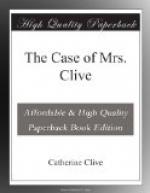Implying that the managers set out to ruin certain performers, including herself, Mrs. Clive accuses them of putting on “a better Face to the Town” by publishing (inaccurate) salary figures—a ploy to get public sanction for lower salaries. Mrs. Clive alludes to salaries published ostensibly by Fleetwood in the papers (e.g., Gentleman’s Magazine, XIII, October 1743, 553), where the pay of such lights as Garrick, Macklin, Pritchard, and Clive in the 1742-1743 season is made to seem higher than the salaries of such worthies as Wilks, Betterton, Cibber, and Oldfield in the 1708-1709 season. The actors, in presenting their case (Gentleman’s Magazine, XIII, November 1743, 609), hit at Fleetwood for citing 1708-1709 salaries, for “the Stage [then] both of Drury-Lane and the Hay-market, were in so wretched a Condition ... as not to be worth any body’s Acceptance.” The players use instead salaries of the 1729 players “to place the salaries of the present Actors in a true light,” since the stage in that year flourished. In 1729, Wilks, the highest paid actor, earned more than his later equal, Garrick. All other principals’ salaries were comparable.
The main complaint of Fleetwood’s company, then, was not only base salary but the “Fallacy” of the manager’s account and his “setting down besides the Manager’s Charges, every benefit Night, what is got by the Actor’s own private Interests in Money and Tickets, as also the Article of 50L for Cloaths, added to the Actresses Account, which is absolutely an Advantage to the Manager, as they always lay out considerably more.” This evidence, if not in itself damning to Fleetwood’s designs toward his actors, at least indicates the internecine breach at Drury Lane. (The inter-theater conflict, important for its effect on repertory and morale, is adequately examined in theater histories and lies outside my interests in this essay.)




